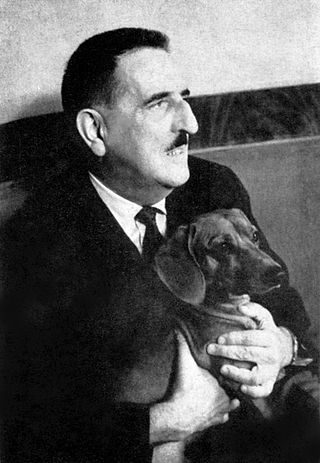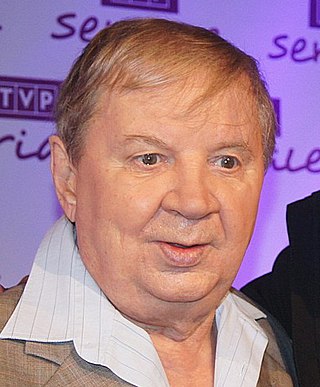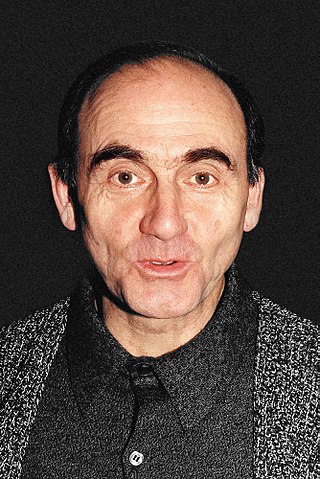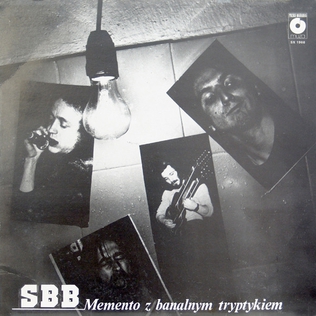
SBB is a Polish progressive rock band formed in 1971 in Siemianowice, Upper Silesia. It was made up of multi-instrumentalist and vocalist Józef Skrzek, guitarist Apostolis Anthimos, drummer Jerzy Piotrowski, and sound engineer Grzegorz Maniecki. SBB was one of the most popular super-groups in Poland and Europe in the 1970s.

Stanisław II August, known also by his regnal Latin name Stanislaus II Augustus, and as Stanisław August Poniatowski, was King of Poland and Grand Duke of Lithuania from 1764 to 1795, and the last monarch of the Polish–Lithuanian Commonwealth.

Jan Alojzy Matejko was a Polish painter, a leading 19th-century exponent of history painting, known for depicting nodal events from Polish history. His works include large scale oil paintings such as Stańczyk (1862), Rejtan (1866), Union of Lublin (1869), Astronomer Copernicus, or Conversations with God (1873), or Battle of Grunwald (1878). He was the author of numerous portraits, a gallery of Polish monarchs in book form, and murals in St. Mary's Basilica, Kraków. He is considered by many as the most celebrated Polish painter, and sometimes as the "national painter" of Poland.

Eugeniusz Horbaczewski was a Polish fighter pilot, a flying ace of World War II, also known as "Dziubek". According to official lists, Horbaczewski was the third highest scoring Polish fighter ace, with 16.5 confirmed kills and one probable kill. He was awarded several decorations, among others Virtuti Militari IV class (posthumously) and V class, four times Polish Cross of Valour, Distinguished Service Order (posthumously) and Distinguished Flying Cross (twice).

The Polish People's Army constituted the second formation of the Polish Armed Forces in the East in 1943–1945, and in 1945–1989 the armed forces of the Polish communist state, ruled by the Polish Workers' Party and then the Polish United Workers' Party. The communist-led Polish armed forces, allowed and facilitated by Joseph Stalin, were the result of efforts made in the early 1940s in the Soviet Union by Wanda Wasilewska and Zygmunt Berling.

On the Silver Globe is a 1988 Polish epic science fiction film directed and written by Andrzej Żuławski, adapted from The Lunar Trilogy by his grand-uncle, Jerzy Żuławski. Starring Andrzej Seweryn, Jerzy Trela, Iwona Bielska, Jan Frycz, Henryk Bista, Grażyna Deląg and Krystyna Janda, the plot follows a team of astronauts who land on an uninhabited planet and form a society. Many years later, a single astronaut is sent to the planet and becomes a messiah.
Tadeusz Piotrowski was a Polish mountaineer and author of several books related to the subject. He has been referred to as "perhaps the finest winter mountaineer of his day".

Jerzy Waldorff-Preyss of the Nabram coat of arms was a Polish media personality, public intellectual, socialite, music critic and music aficionado. He wrote over twenty books, mostly on the subject of classical music and society. Waldorff is known as "the last baron of the Polish People's Republic".

Jerzy Borejsza was a Polish communist activist and writer. During the Stalinist period of communist Poland, he was chief of a state press and publishing syndicate.

Roman Kłosowski was a Polish character actor and stage director.

Around 6 million Polish citizens perished during World War II: about one fifth of the entire pre-war population of Poland. Most of them were civilian victims of the war crimes and the crimes against humanity which Nazi Germany and the Soviet Union committed during their occupation of Poland. Approximately half of them were Polish Jews who were killed in The Holocaust. Statistics for Polish casualties during World War II are divergent and contradictory. This article provides a summary of the estimates of Poland's human losses in the war as well as a summary of the causes of them.

The Polish Institute of International Affairs is a Polish think tank based in Warsaw which carries out research and training in international relations. In this field, it ranks as one of the most influential think tanks not just in Central and Eastern Europe but in the European Union as a whole.
Jerzy Kroh was a Polish chemist, the founder of a radiation chemistry school in Łódź, and the author or co-author of about 400 publications and several books.

Stanisław Józef Blok DFC (1916-1994) was a Polish fighter ace of the Polish Air Force in World War II with 5 confirmed kills.
Jerzy Popławski DFC was a Polish fighter ace of the Polish Air Force in exile during World War II with 5 confirmed kills.

Jan Peszek is a Polish theatre, film, and television actor. Although primarily involved in theatre work, he has appeared in more than sixty films since 1970. He is most well known for his work with dramaturgist Bogusław Schaeffer.

Jan Piotrowski is a Polish Roman Catholic bishop, being the archbishop of the Roman Catholic Diocese of Kielce since 2014. He previously served as the auxiliary bishop of Tarnów and titular bishop of Sinitis from 2013 to 2014.

Memento z banalnym tryptykiem is the ninth studio album by the progressive rock band SBB.

Nowy horyzont is the first studio album by SBB, released in 1975 by Polskie Nagrania Muza. It was reissued by Metal Mind Productions in 2004 and 2005 with four additional tracks.

Konrad Ksawery Swinarski was a Polish theatrical, television, film and opera director and stage designer.

















